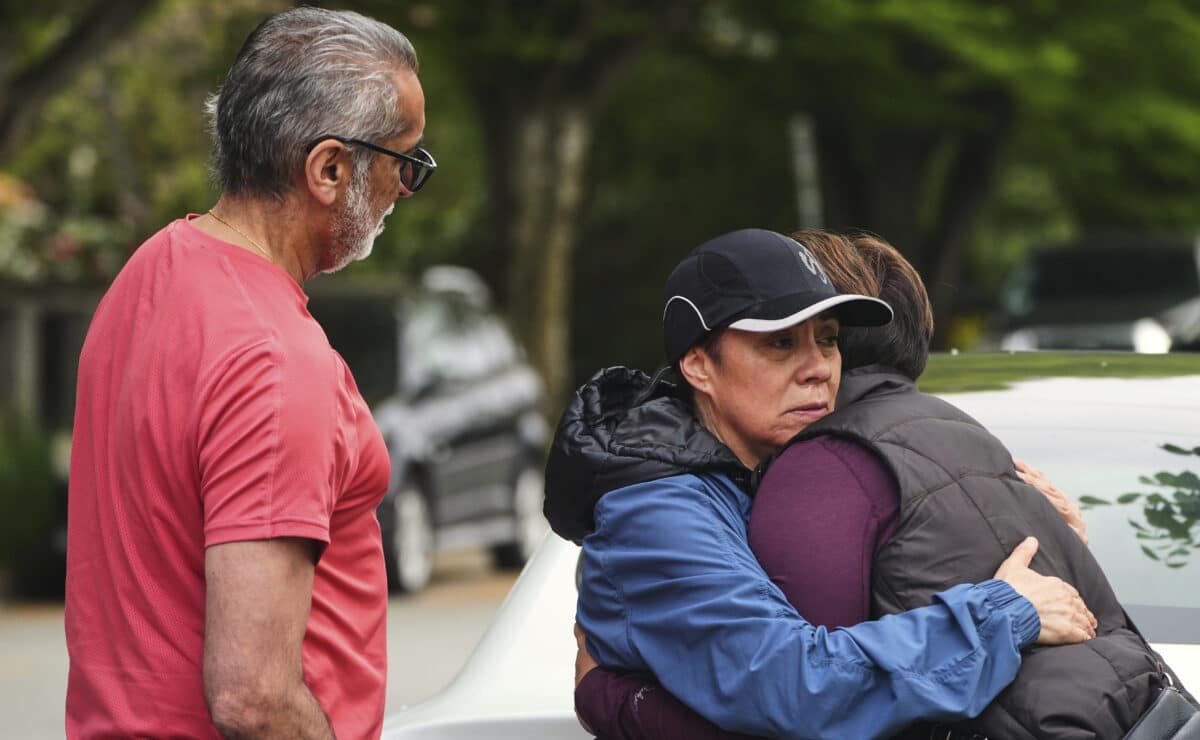Mental health not ideology behind Lapu Lapu festival tragedy, officials say

Esperanza Bermudez, center, who lives across the street from the scene, is comforted by friends Ronnie Claire, right, and Manjit Claire, the morning after a driver killed multiple people during a Filipino community festival Sunday, April 27, 2025, in Vancouver, British Columbia. (AP Photo/Lindsey Wasson)
Eleven people ages 5 to 65 are dead. Dozens more are hurt after a car ramming incident at a Filipino community event in Vancouver, Canada, and the numbers could go even higher still.
It is being called by officials as the “darkest day in Vancouver’s history.”
But first some Filipino context.
The community event – like the many street celebrations in Filipino communities everywhere with the food trucks, the meat sticks and lumpia – was celebratory.
This one to honor Lapu-Lapu.
Too many people coming to this news don’t even know who he is.
For what he did, Lapu-Lapu is the legendary spirit of a free Philippines.
To a Filipino, Lapu-Lapu is the only Filipino who could be compared to America’s first general, George Washington, the man who stood up to the British.
It was on April 27, 1521, Lapu-Lapu ended the first colonial advances in the Philippines by killing Ferdinand Magellan.
And this is what makes this weekend’s event tragic to our Filipino core.
More than 500 years later, on April 27, 2025, a thriving global Filipino community after celebrating Lapu-Lapu are left mourning.
On Saturday, around 8 p.m. Pacific time, the joy of a liberation moment was reversed by one man who used a vehicle to batter innocents in a crowd.
Police have a suspect in custody, a 30-year-old male, who they allege drove into pedestrians in a neighborhood in the south of Vancouver at East 42rd and Fraser streets.
“This guy, he killed some of my customers,” Yoseb Vardeh, a food truck owner selling bao buns told the BBC. “There (were) people waiting for their buns that got hit…I stepped outside of my food truck and I just saw bodies underneath people’s food trucks, husbands crying out for their wives or their kids…It was just horrible.”
At a news conference, acting police chief Steve Rai ruled out the attack as “an act of terrrorism,” that is to say an attack whose origins were ideolgical or political.
Yet, there is no doubt there is a sense of terror this act has spread through the Filipino, and the broader community.
Some even wondered why there wasn’t a greater police presence at such a community event, the lack of which made the gathering a soft target.
“No intel,” was the response, which is hard to imagine since there have been violent incidents like a Vancouver Chinatown event more than a year ago.
“We can’t create a police state here,” Rai said. But he did admit that police have had instances with the suspect over the last 12 years, and they stemmed from “health-related issues.”
Rai wouldn’t comment further on the mental health state of the suspect.
But Vancouver Mayor Ken Sim did acknowledge the problem in general.
“We do need mandatory care for people with significant mental health challenges or substance abuse disorder,” Sim said. “It’s the humane thing to do. We have people on the streets, who cannot direct their own care and they’re causing harm to themselves and other people.”
Sim added: “This has been going on for too long and throughout many administrations. We need that mandatory care faster. We need more of it and we need it faster. We cannot take a government approach to this. Lives are on the line. Communities are at stake. And I would challenge any elected officials to go to (the Filipino) community and say, we’re working on it, you know. And it might take a little longer, you know, that community is going through a really difficult time and we owe it to them, and we owe it to Vancouverites to go a lot faster on this”
When prompted by a question, he said it directly: “We want tangible action.”
With a federal election in Canada on Monday, all of Canada will be thinking about this when they go to the polls.
In fact, we should be thinking about it everywhere, when mental health is not prioritized and people are just released on the streets.
After the election, Sim said, it doesn’t matter what party that person represents. “We still need that help.”
That’s fine for the living.
And what for the families of those grieving? For the 11 dead, and the dozens injured, there is only the pain of a celebration turned bad.
Emil Guillermo is an award-winning journalist, news analyst and stage monologuist. He writes for the Inquirer.net’s US Channel. He has written a weekly “Amok” column on Asian American issues since 1995. Find him on YouTube, patreon and substack.

